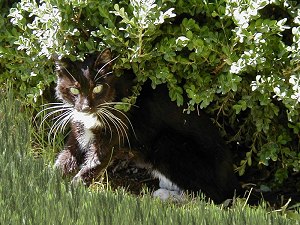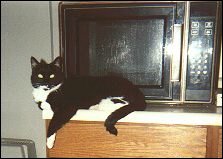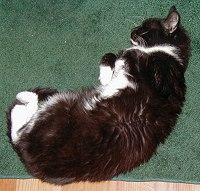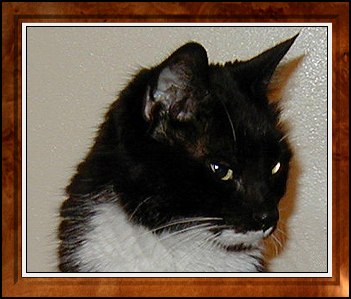
Bette's main concern about Buster had been that he would never adapt to another household. He was a "hider" -- whenever company came to visit, he was nowhere to be found. He was also a picky eater (I don't think he had ever eaten canned or dry cat food, just turkey, chicken, and tuna - essentially whatever Bette was fixing for dinner), and was only used to having one person in his life. As near as I could tell, he'd never met another cat. The first 2 days Buster was here, he hid under the bed (actually, inside the box springs). He refused to eat, and would only hiss if I tried to touch him. The second night, I spent 2 hours lying prone on the floor, talking and cooing to him. Eventually, he climbed out of the bed and walked over to me - and, quite literally, "furred" me, pushing his face against mine until I could barely breathe from all the cat fur. He also took the opportunity to tell me his entire life story; I think he talked non-stop for 15 minutes. He clearly needed the litter box, so I picked him up and carried him into the bathroom. He used "the facilities" then dashed back under the bed. Next day I arranged the den for him - put a basket under the chair, and covered the chair with a towel so he could hide. New litterbox, cat dishes, etc., were readily available in the room for him. We closed the door, and I'd go visit with him every few hours. By the next evening, we were keeping the den door open for longer and longer periods of time. Shortly after that, Libby essentially moved into his room (the den) with him, took over his basket, and taught him the finer points of cat socialization and playing. For a while, he had a definite "angst" about the other boys and Su-Su, and he prefered to stay in his den and howl (just like a dog!) for attention. Eventually, he became comfortable in moving between the den, bathroom, and bedroom. He became a happy, healthy,
contented
cat, fully integrated with the rest of the household. He held his own
ground with the boys, staked out several spaces in the house as
his
own, and no longer hid when visitors arrived; he even let
the
Schwan Delivery Man (who came over for 15 minutes every 2 weeks) pet
him. Buster typically followed me into various rooms - unless the door was closed tightly, he'd figure out a way to open it. He had also been known to spend hours sleeping on one arm while I was at the computer.
|
  September
2001 - Buster was diagnosed with a fatal blood disease (either
Leukemia or Lymphoma but most likely Nonregenerative Anemia, where the
bone
marrow can't replace the blood cells that are dying off). For
weeks I
watched him fade away to skin and bones, trying various medications and
diets. By September 8, he had insufficient strength to do much more
than
sleep, and when he was awake he was glassy-eyed and shaky. That
afternoon, the vet and I helped him ease out of the world. Buster's
last
request, before we went to the vet, was to go outside into the bright
sunshine
and visit the front yard - something he had been allowed to do only
once
before. We sat on the grass and absorbed the heat and talked, just like
we had
talked when he first arrived. This picture is the last one before
we drove to the vet. September
2001 - Buster was diagnosed with a fatal blood disease (either
Leukemia or Lymphoma but most likely Nonregenerative Anemia, where the
bone
marrow can't replace the blood cells that are dying off). For
weeks I
watched him fade away to skin and bones, trying various medications and
diets. By September 8, he had insufficient strength to do much more
than
sleep, and when he was awake he was glassy-eyed and shaky. That
afternoon, the vet and I helped him ease out of the world. Buster's
last
request, before we went to the vet, was to go outside into the bright
sunshine
and visit the front yard - something he had been allowed to do only
once
before. We sat on the grass and absorbed the heat and talked, just like
we had
talked when he first arrived. This picture is the last one before
we drove to the vet. |

 Buster,
a black and white tuxedo male, was about 4 years old when we adopted
him in August 1997. He was
raised by a dear coworker of mine named Bette. He was her sole
companion
and when she died at 80+ years, we took him in because the relatives
weren't
sure what to do with him, and Bette had expressed the opinion early on
that he would need to be put to sleep when she died.
Buster,
a black and white tuxedo male, was about 4 years old when we adopted
him in August 1997. He was
raised by a dear coworker of mine named Bette. He was her sole
companion
and when she died at 80+ years, we took him in because the relatives
weren't
sure what to do with him, and Bette had expressed the opinion early on
that he would need to be put to sleep when she died. 